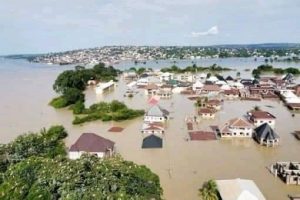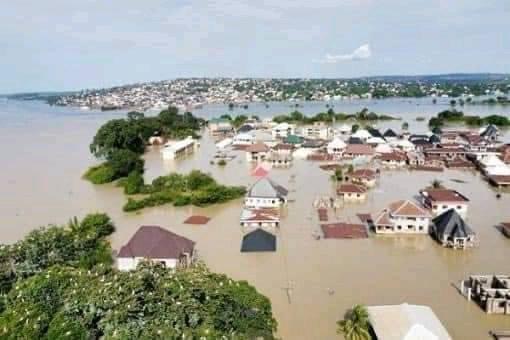Rivers State And 20 Other States To Battle Flooding -FG Warns
The Federal Government, on Thursday, said no fewer than 10 states and the Federal Capital Territory, Abuja, had either experienced various degrees of flooding or recorded casualties as rains intensified.
The Minister of Water Resources and Sanitation, Prof Joseph Utsev, who dropped the red alert during a press briefing in Abuja, warned that 21 more states might suffer flooding.
He stated this against the background of the Wednesday downpour which grounded business and commercial activities in Lagos and Ogun states.
The resulting flooding brought down a two-storey building in the Mushin area of Lagos and overwhelmed residents while pupils could not attend schools in parts of the state.
Also, a pupil was swept away by the flooding in the Ketu area of Lagos.
Utsev explained that the Annual Flood Outlook by the Nigeria Hydrological Services Agency released in April had predicted that 148 local government areas in 31 states fell within the high flood risk areas.
The affected states include Adamawa, Akwa Ibom, Anambra, Bauchi, Bayelsa, Benue, Borno, Cross River, Delta, Ebonyi, Edo, Imo, Jigawa, Kaduna, Kano, Katsina and Kebbi.
Others are Kogi, Kwara, Lagos, Nasarawa, Niger, Ogun, Ondo, Osun, Oyo, Plateau, Rivers, Sokoto, Taraba and Yobe.
Cholera may spread
The minister warned that cholera might spread further in Nigeria due to the flooding.
He further stated that river flooding would begin this month, and would hit Ondo, Kaduna, Anambra, Benue, Adamawa and 12 other states
According to him, out of the 31 states where the Annual Flood Outlook predicted would experience flooding, the incident had occurred in 10.
Providing a national update on flooding, Utsev said, “It should be noted that some states have started experiencing varying levels of flooding and its associated disasters as early as April this year.
“So far, more than 10 states of the federation and the FCT have experienced one degree of flooding or the other with several casualties recorded including displacement of people and loss of property.
At this point, it is important to state that river flooding is expected, beginning this month (July 2024). The states that are likely to be impacted by this as predicted are Akwa Ibom, Anambra, Adamawa, Benue, Bayelsa, Cross River, Delta, Edo, Jigawa, Kogi, Kebbi, Kaduna, Niger, Nasarawa, Ondo, Ogun, Rivers, Taraba and the FCT,” Utsev stated.
The minister recalled that in April 2024, he presented to the general public the 2024 Annual Flood Outlook by the Nigeria Hydrological Services Agency, an agency under his supervision.
The agency has the responsibility for the provision of information on flood forecasts and alerts and monitoring of all the major rivers in Nigeria, including the trans-boundary Rivers Niger and Benue.
“The AFO shows that 148 LGA in 31 states fall within the High Flood Risk areas, while 249 LGA fall within the Moderate Flood Risk areas with the remaining 377 LGA falling within the Low Flood Risk areas.
The high flood risk states as predicted are Adamawa, Akwa-Ibom, Anambra, Bauchi, Bayelsa, Benue, Borno, Cross-River, Delta, Ebonyi, Edo, Gombe, Imo, Jigawa, Kaduna, Kano, Kebbi, Kogi, Kwara, Lagos, Nasarawa, Niger, Ogun, Ondo, Osun, Oyo, Rivers, Sokoto, Taraba, Yobe, Zamfara and the FCT,” Utsev stated.
The minister pointed out that Nigeria is located within the River Niger Basin which is occupied by eight other countries including Benin, Burkina Faso, Cameroun, Chad, Cote D’ Ivoire, Guinea, Mali and Niger.
“The country is at the lowest portion of the basin. This means that once the upper catchment of the basin gets flooded, Nigeria should be prepared to experience flooding incidents. It is important to note that the month of June 2024 signifies the beginning of hydrological year 2024/2025 in the Niger Basin.
The flow situation within the catchment is currently within normal as the rising water levels at our various monitoring stations in Niamey are still within acceptable levels.
“The flow situation at Jiderebode in Kebbi State upstream of Kainji and Jebba reservoirs which is the first monitoring station on the River Niger in Nigeria is still at the normal situation. The same applies to the flow at Lokoja, Kogi State (the confluence of Rivers Niger and Benue).
“We are also monitoring the development on the River Benue Sub-Basin. Here, Wuroboki in Adamawa State is our first monitoring station where the flow from the upstream Cameroun is received. The flow situation at Wuroboki is relatively normal at this time, so there is no cause for alarm in terms of water releases in the Benue River basin.
The Lagdo Dam operators have informed us that they are currently filling the dam for hydropower generation. However, we will keep monitoring the development on this flank and put close tabs on other monitoring stations as we are approaching the critical months,” he stated.
The Director-General of NIHSA, Clement Nze, underscored the Federal Government’s advisory role, noting that enforcement and local action fell under the states’ jurisdiction.
He said the central government would continue its efforts to construct buffer dams alongside the Lagdo Dam in Cameroon, to mitigate flood risks. A senior police officer at the Ketu Division, who was not authorised to speak to the media, confirmed the tragedy.
The officer said, “It is a sad occurrence. Though the matter was not officially reported, we got wind of the incident and sympathised with the family.”
In another development, a resident in the Aguda area of Lagos identified only as Aluta Mama, told our correspondent that some of her home appliances were submerged.
She added that she and her family members had to leave their home pending the time the flood would abate.
“The impact is heavy. We had to leave home for the flood to subdue. Some of my properties and appliances were submerged in the flood,” Aluta Mama said.
Another resident in the Pen Cinema area of Agege, Lagos State, Anuoluwapo Atanda, disclosed that though she was not affected by the flooding because she lived in a storey building, it affected those living on the ground floor of her house.
“My house is a storey building so the occupants upstairs were not affected but those downstairs woke up to the flooding in their room so they were unable to protect their valuables. Everywhere flooded’
She said, “As I speak, we are still cleaning everywhere with rags because the flood is still flowing. The flood dug a passage in my toilet and started flowing in, so we repaired the spot this morning to curb that.
“Most residents are indoors because the flood has overtaken the road. My family cannot step out of the house and a lot of electronic appliances are now bad.
“There is a woman beside our house whose fence collapsed under the intensity of the flooding. Whenever there is a downpour, we are always in a panic mode but this time, the flood was worse because it affected everyone. We have been finding it hard to cope with the messy situation,” Ojelana said. On Thursday, the Special Adviser on Environment to the Lagos State Government, Olakunle Rotimi-Akodu, urged residents in low-land areas and other parts of the state to register with the Lagos State Residents Registration Agency.
Akodu, in an interview with one of our correspondents, maintained that such data would be useful in emergencies.
He said although the government had not set up a temporary shelter or camp for the flood victims, it was still important for them to immediately relocate to upland areas.

